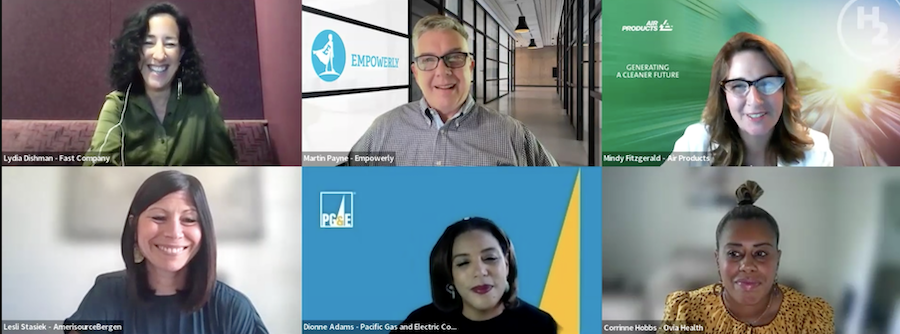Supporting Women’s Well-Being Through All Their Life Stages


Women’s health goes beyond maternity, menopause, and fertility. “There’s so much in between,” said Corrinne Hobbs, general manager and VP for employer market organization at Ovia Health. “Women are complex, and being able to support women at every stage in their journey is important. And each journey is unique.”
Hobbs credits an app she can access through Ovia, a family-building solutions company, with helping her succeed at her job while being a busy mom. “Having that loyal companion in my pocket to give me trustworthy advice about kids, lactation, and also supporting my return to work, ensures I understand what my options are, what I should be asking my employer, my physician, and beyond,” she said during a panel discussion at From Day One’s July virtual conference.
“What employers are looking for is full spectrum end-to-end support,” she said. A solution that incorporates all components of women’s health and well-being is crucial.
Workplace Solutions for Nursing Mothers
Dionne Adams, director of diversity, equity, inclusion, and belonging at Pacific Gas & Electric Company, says the company’s women’s health network, an employee resource group, has helped management see the need for nursing moms’ rooms for women returning to work.
“When I was a nursing mom, I had to go into an IT closet, which was not a great feeling,” she said. “I’m excited because new moms don’t have to experience this. We have designated rooms throughout our headquarters in different locations.”
These rooms have chairs to relax in, breast pumps, and a refrigerator for breast milk, says Adams.
Similarly, a colleague who was a new mother had to figure out the logistics of business travel while nursing, says Mindy Fitzgerald, global director for diversity, culture, and engagement for Air Products.
“We were able to institute some nursing facilities at that location as well as some breast milk transport back home to her baby,” Fitzgerald said. “The big win for her was that she spoke up and said, ‘This was amazing. I didn’t miss out on a potential career altering conference. And I had the support to continue nursing my child.’”
The company was able to codify that benefit into its policies and procedures. “That’s a small but really exciting example of a high-potential employee figuring out how to make life work in the midst of all their responsibilities, both at home and at work,” Fitzgerald said.
Onsite Child Care
Martin Payne, chief commercial officer at Empowerly, says onsite child care and other benefits for caregivers are game-changing, especially for front-line employees.
“There are many corporate employees who have a lot of resources and can take care of some of those things themselves,” he said. “But there are a lot of employees who really have gaps. And those gaps can make a big difference in whether or not they can get to work.”

Child rearing still falls predominantly on the shoulders of women, even in a two-partner household, says Payne. So support for these employees is necessary. “Having that resource and that extra time and breathing room in your workplace really just makes a big difference for them,” he said.
Menopause: Breaking the Silence
Of all the stages of a woman’s life cycle, “I feel like menopause is the one that’s least talked about and supported right now,” said Lesli Stasiek, senior director of HR at Cencora.
Most women experience menopause between ages 45 and 55, when they are hitting peaks in their careers. This impacts the talent pipelines for senior leadership positions at companies, says Stasiek. Some women opt out of the workforce altogether during menopause, which equates to a loss of $150 billion globally, Stasiek added.
The stigma surrounding this life stage doesn’t help. About 50% of women aren’t comfortable talking to their employer about menopause symptoms, and 73% of women are not treating menopause, says Hobbs.
Employers should ensure that women have access to educational materials about menopause and help them find certified menopause experts. Hobbs also recommends peer-to-peer groups and connections to a nursing team.
PG&E’s women’s health network is helping the company roll out menopause support for its workers, says Adams. “We’re partnering with our benefits and employee relations team to create communications around that, and then educating leaders to have more awareness around this particular stage of life for women that are either entering menopause or in the midst of it,” she said.
Mary Pieper is a freelance writer based in Mason City, Iowa.
The From Day One Newsletter is a monthly roundup of articles, features, and editorials on innovative ways for companies to forge stronger relationships with their employees, customers, and communities.